This interview is part of our interview series, where we curate stories of regular people that decided to design a life they love. (click here to learn more).
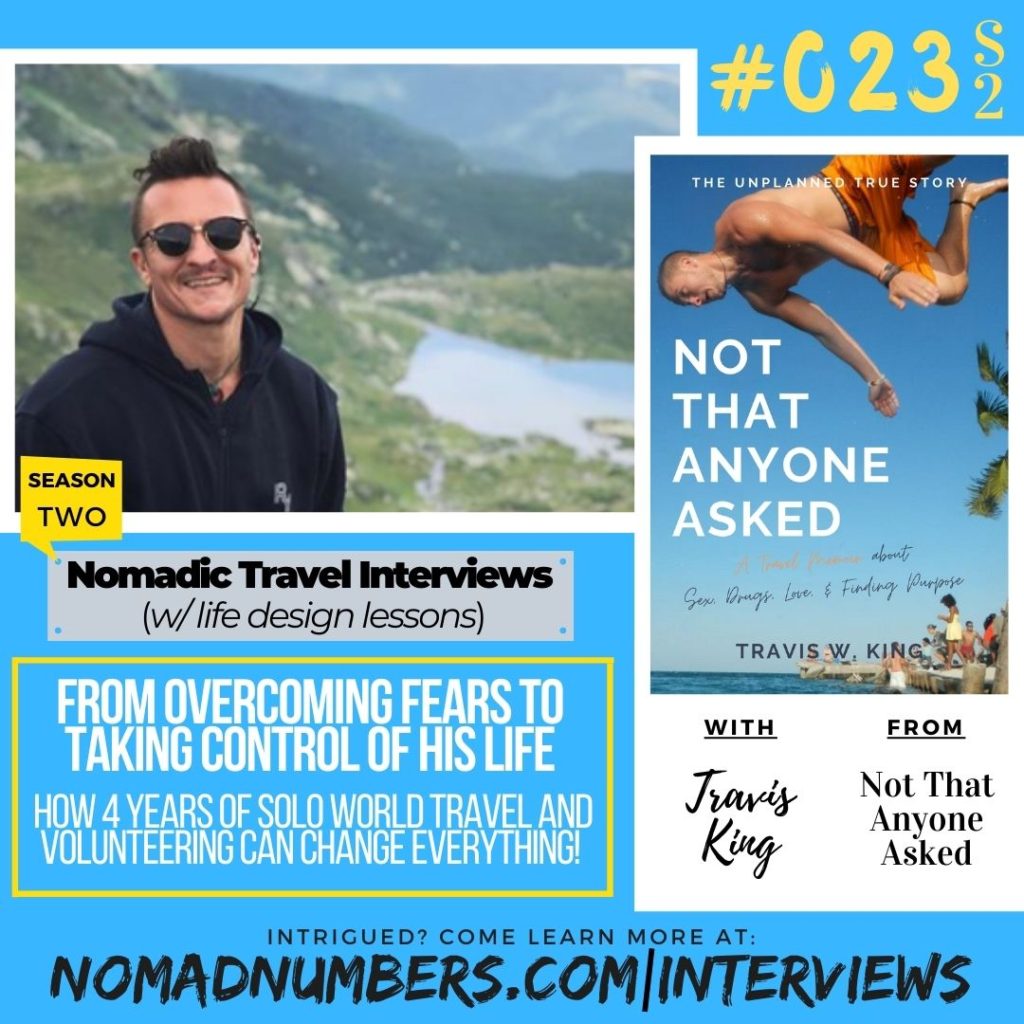
Travis King from Not That Anyone Asked
Some links to the products mentioned below are affiliate links, meaning that if you click and make a purchase, we (Nomad Numbers) may receive a commission at no additional cost to you. For more information please review our disclaimer page.
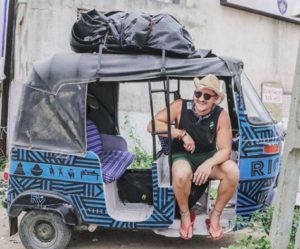
- Can you introduce yourself?
My name is Travis King and I’m 37 years old, originally from Milwaukee, Wisconsin. I spent the first 10 years of my career (18-28) working with youth. I was a camp director, after school program coordinator, and even went back to school to get a Master’s degree in nonprofit management as a Trinity Fellow at Marquette University.
As that two-year program was finishing and everyone was questioning my next professional pursuit, I thought to myself, “when do I ever get to make a choice for myself, for my life, and not for my resume?” That thought led me on a 5-month trip to South America as soon as my Master’s finished. I went on to solo travel and volunteer all over the world for 4 years (which I wrote my first book about). Those four years ended with landing a job in the travel industry as one of Remote Year’s first program leaders. After leading their third group around the world for a year, I was promoted to the Director of Community, where I helped grow and unite a community of 2,000+ digital nomads for over 3 years. The pandemic shut us down, and now I’m officially unemployed (by choice), living in Puerto Escondido, Mexico.
- What does a typical day in your life look like for you today? How does it differ from your life before?
I’m unemployed by choice, but I stay very busy. I run a remote work consultancy (Sprawl Consulting), I write, play music, and I’m developing a few local projects here in Oaxaca. My partner and I bought a piece of land a few minutes from the beach in the La Punta neighborhood of Puerto Escondido, and plan to open a co-working/co-living community space in the next few years. I have a lot of iron on the fire, so to say, and my typical day involves a number of different projects or initiatives.
Here’s a typical day, more or less.
- 7:30am – Take my dog out to pee then fall back asleep for 30 minutes
- 8:30am – Make coffee, study spanish, read for leisure
- 10:00am – Check email, organize the rest of the day, start working on a writing project or something
- 12:00pm – Work in my woodshop on something fun (I build with wood and play with cement most weeks)
- 2:00pm – Go to a cafe to work (try to promote my book, work on the consultancy, write a blog post, work on my website etc.)
- 4:00pm – 20 minute nap (they’re the best)
- 5:00pm – Head to a meeting about community improvement projects (trying to improve recycling systems and get more trees put in the ground currently)
- 6:00pm – Play volleyball on the beach (every day there’s a game in La Punta and it’s amazing)
- 7:30pm – Dinner with my partner and pup (we cook at home most nights)
- 9:00pm – Gig at a restaurant with my band (Just Best Friends). I’ll end the day with a few beers and mezcals while singing crowd pleasing covers. *nights I don’t play music I usually netflix and chill at home with Maria and Rue dog.
The major change through my previous life schedule and my current one is that I dictate it entirely. I decide exactly what time I want to set my alarm for every morning, and what things feel like the greatest priorities. After my tenure at Remote Year ended I was keenly aware I would never find a job that suited me so well, so I made it my goal to never work for anyone again. To hustle, get creative, and just figure it out. So far, so good.
Life design journey
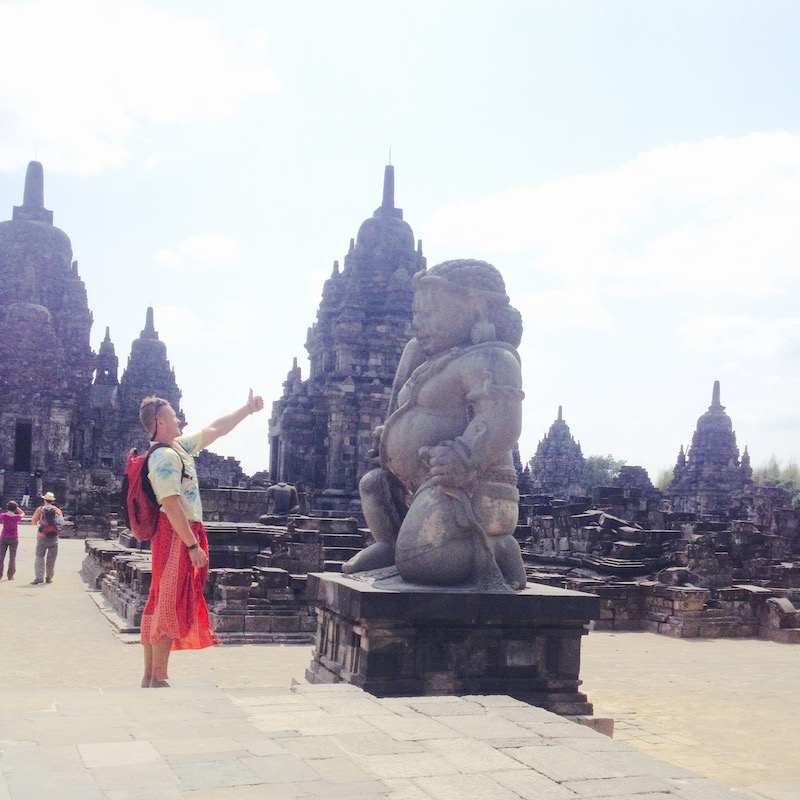
3 – What inflection point led you to decide to change your life trajectory?
I mentioned the thought I had as grad school was winding down earlier. Basically, I had made every major choice in my life based on staying on “the most approved path” and what would make most sense for improving my resume. I could really sense that if I took a big job in the nonprofit sector, the house and kids weren’t far behind—it was like a feeling of inertia pulling me towards a future I didn’t necessarily want.
That first trip to South America showed me that the world was open. I grew and learned more in those 5 months than at any previous point in my life and I was hooked. Every new day, every new country, every new connection since then has just made the world feel more and more open. Travel gave me the sense that I can chase any dream I want, and that’s what I’m doing today.
4 – What were some of the limiting beliefs that hold you back initially?
It was mainly two things.
- First, I was a scared young pup at the start of my travels. As normal as it feels now to book a flight and land in a foreign country, I still remember exactly what 28 years old me felt like packing for South America. I had no idea what I was doing, no idea what I was going to do when I got there, and no idea how to even get myself water when I did arrive (story is in the book).
- Second, it was this pressure I felt both from society at large and directly from my parents and friends to follow in their footsteps. There was a version of what a “successful life” looked like that was taught to me in myriad ways throughout my upbringing—and it had nothing to do with being well-traveled or volunteering abroad. I was supposed to pick a career, pursue it to the end, and raise a family. That blueprint for success didn’t ever really appeal to me, and it took until that first trip to South America to accept that I was going to have to disappoint some people to live the best version of my life.
Here’s a reflection on this question from the preamble to my book:
For my generation—the one that went from long curly phone cords to the iPhone in ten short years, the one who will hold an average of around eight jobs before turning 30—the societal and familial pressure I faced to be a success was likely not unique.
It’s natural that our parents would want our lives and careers to resemble theirs, the same way we hope our babies carry our features and show off our DNA, but the world is changing fast and I wasn’t interested in chasing someone else’s idea of success. This book is as much about figuring out what my purpose is, what a good life is, and what success looks, feels, and dresses like for me, as much as it is about travel.
Alongside all of the new countries, rare moments, and characters that come with well-lived days, I hope to make you pause and think. I hope to make you reconsider long-held assumptions and personal beliefs, especially those that have started to feel more like facts than opinions, those ideologies that have come to feel like the temperature in your mind—like water to fish. I hope this book opens the windows and allows a cool breeze to flood the hallways of your brain.
Travis King – Not That Anyone Asked
5 – What did you do to prepare the transition to this new destination and how did you do it?
We moved to our current home in Puerto Escondido from Mexico City, where we were when the pandemic hit. For that move, I bought a 25-year-old white Ford F-150. His name is Fonzy and it was the best $3,000 I’ve ever spent. We packed our little black shelter pup Rue in the front seat with us, and all of our worldly possessions in the truck bed, and made the two-day drive. The truck overheated and broke down ten times over those two days, but we made it. We plan to call Puerto Escondido home for a long time now and that first journey here is one I’ll never forget.
6 – Once on the journey, what were some of the biggest wins you realized? What were the challenges you had to face along the way?
So many things. One of the most addicting and amazing aspects of travel is simply how open the travel community is. On the road—on a bus or in a hostel—you’re expected to say “Hi, I’m Travis, what are y’all doing tonight?” That feeling of easy friendships and easy love was what I really fell in love with on that first big trip. I made lifelong friendships and formed years’ worth of memories in weeks.
Another thing that I learned throughout the travels is how many different versions of a successful life there are. Seeing people extremely content and happy in some of the poorest corners of the world helps to reframe everything. I was slowly breaking that blueprint for success that I was handed, and eventually, I started working on a new one of my own.
7 – How long did/will it take to reach the destination? Any advice to make the journey as enjoyable as possible?
I’m still “on my way” when it comes to the destination. I want to build this vision we have for a healthy, happy beach community where people from all over the world come to work, make new connections, and live a wonderful version of their lives playing daily volleyball and sipping mezcal at sunset.
In terms of making travel as enjoyable as possible, I recently published this blog about 5 mistakes seasoned travelers never make twice. Avoiding them will help to make your travels more enjoyable. Also, my first ever travel blog that got passed around the internet was on a similar topic. It’s called 13 Things Backpackers Already Know and Future Backpackers Definitely Should.
8 – What did the people around you (friends/family/colleagues…) think of your plan to take on this new life?
Here’s a reflection on this question from the dedication of my book. I dedicated it to my father, who largely raised me after my mother passed when I was 10 years old. He’s the absolute best, but he’s a baby boomer and had some very serious concerns about my life choices.
It took time—years of actual evidence—for him to know that I would “be fine,” showing up at Christmas every year, no matter how far away I was, with some worldly gifts and the same smile. A lifetime’s worth of memories to unpack from the latest adventures. He saw I was happy. He softened.
It also took some mental gymnastics on his part I’m sure—pushing past the baby boomer generation’s preconceived notions of what success looks like. Those ideas of success weren’t mine, and I was chasing a different dream; I didn’t want to die in a house with the most toys. I don’t think it was one conversation or one photo he saw of me smiling in a foreign country that flipped a switch. I think it was likely the slow and steady stream of evidence mixed with a sincere questioning of his own assumptions of what a “good life” and a “good job” looked like.
Whatever pieces contributed to this puzzle he was working on, he eventually finished it, and then he took a step back to see what the picture was. When he adjusted his little Benjamin Franklin glasses on his cute wrinkled face, he would see that the picture formed simply read: “Your son is happy and free, he’s seen more of the world than most people ever will, and it’s in large part thanks to you.” It would take years and thousands of miles for us to get there, but my Dad is finally proud of “his son, the world traveler,” and that makes me happy.
Writing this book made me nervous because I knew he would read it, but I also knew that for it to be any good I had to be honest, be human, and tell every story. I hope this book makes him proud as well—drug stories and all. I went out and made myself interested, Pops.
Travis King – Not that anyone asked
Cost of living
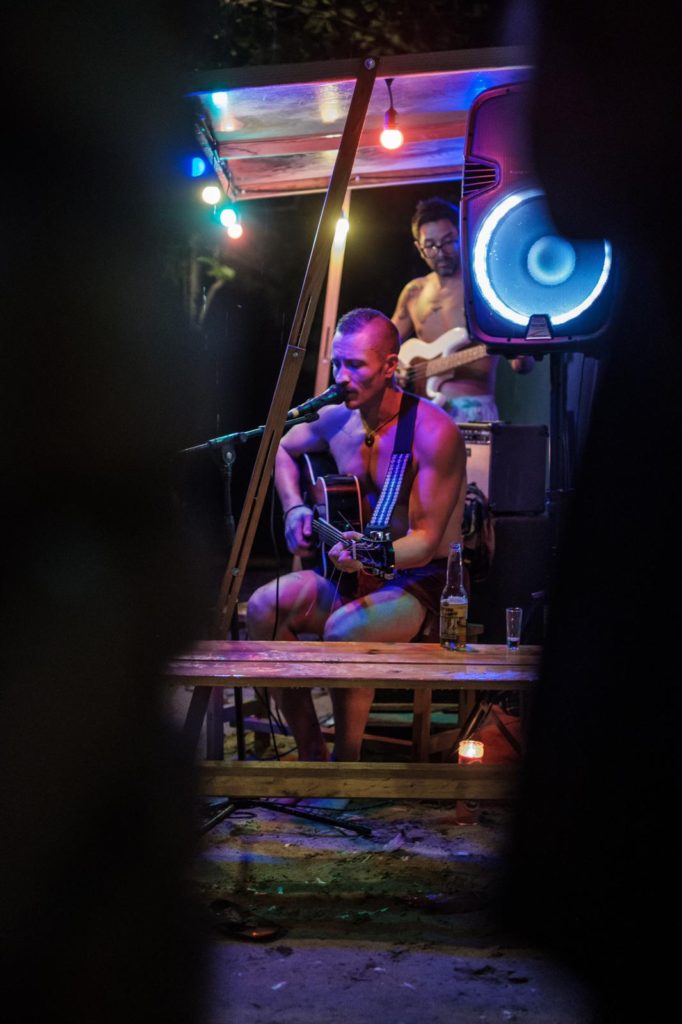
9 – How much yearly expense did you have before and after this change in lifestyle?
I’ll answer this about my life 10 years ago (in the States during grad school) and now.
- 1 Month of Life in the US during Grad School: Rent ($750), food ($150), going out ($200), eating out ($150) = $1250
- 1 Month of Life in Puerto Escondido: Rent ($150), food ($250), going out ($20), eating out ($40) = $460
One of the biggest ways I currently save money is by making money when I “go out.” I’m usually drinking and eating for free when I go out as part of my payment for playing music, and that change of making $40 during a night out instead of spending $40 on a night out adds up dramatically over time.
This estimation above is fairly accurate across my main spending categories. (I spend a bit on my phone, wifi, gas, and a few other things, but they’re all comparable to what I would have spent in the States on the same things.)
10 – What strategies have you used to reduce your expenses? And what strategies have you used to fund your lifestyle?
So, I do a number of things still, habits that began on the road, that save me money every week. Here’s the shortlist:
Top 6 habits from the road that will save me money for the rest of my life:
- Not paying to read (I use a library card and rent books to my kindle)
- Not paying for water (I carry a water everywhere I go and try my best to keep it full with free water)
- Not paying for haircuts (I travel with a pair of clippers and have asked many a new hostel mate to “help with the back”)
- Not paying to exercise (I run, do yoga from an app, and use my body weight to get sweaty 5 or 6 times a week while travelling)
- Not overpaying to party (I generally carry a stainless steel hip flask full of whiskey when I go out looking for international trouble)
- Not losing money on exchange rates or lost change (I take an incredible amount of pride on crossing the border with no leftover cash or change in my pocket. I’ll manage my spending wisely and use the end of my cash on peanuts and Oreos just before boarding the flight or getting back on the bus at the border)
Lessons, tips & advices
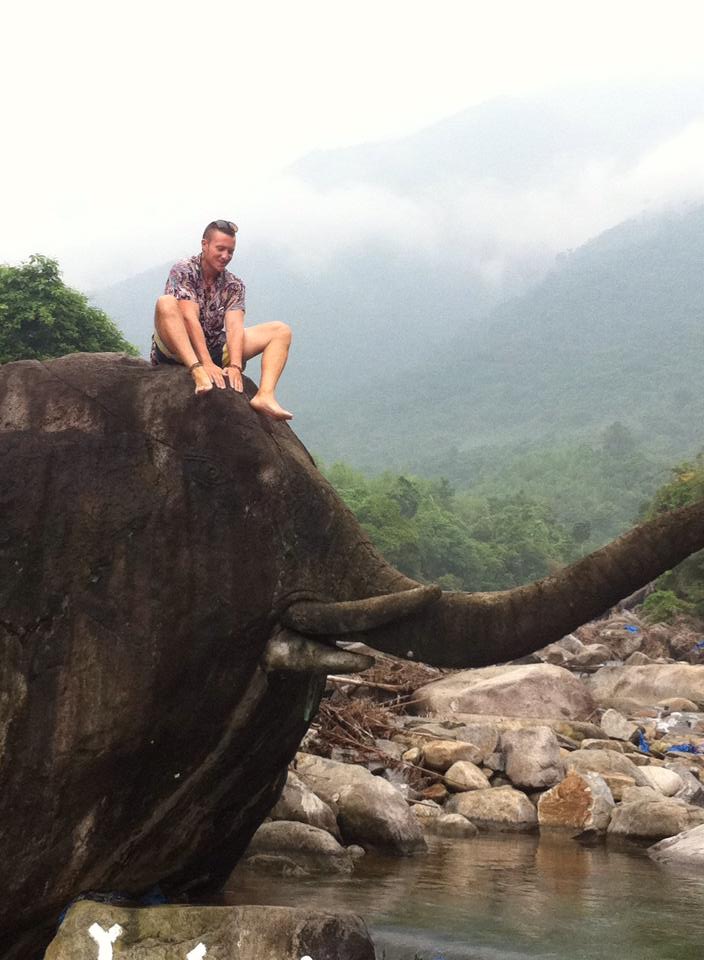
11 – If you had to do it again, what would you do differently?
Not much. The one thing I would definitely have done differently is sticking with Spanish in high school. I got a C my freshman year, then switched to Latin because it was known to be an easy A at my school. I got an A in Latin the next two years, but now I live in a Spanish-speaking country and spend time trying to improve my Spanish every day. It’s difficult.
At the time, everyone around me made it feel as though my GPA was the most important thing in the universe, not learning a life skill like Spanish. So, I can’t tell you a single thing in Latin today, and learning fluent Spanish is a huge priority for me, but my GPA was maybe .2 better for it.
12 – What advice do you have for others who are considering going through a life design exercise?
I’m a huge advocate of visioning and goal-setting exercises. A visioning exercise at a Remote Year retreat 4+ years ago was the reason I started writing my book. My advice for all things like this is that learning comes from doing—the root of learning is an experience – so don’t “think your way” into a better life. Just start doing the changes you want for your life in scalable incremental steps, and know that when it gets hard, that’s when the growth is happening. Muscles get sore when you work out, but it’s how you get stronger.
Or as I say towards the closing of my book in terms of how to travel forces you to learn, grow and adapt every single day:
Dipping into that fear, fully submerging in it, is what will forge your armor, like an icicle growing in size and strength with the uncomfortable melting of each intense morning sun. When the night comes and brings a chill—time to reflect on what you’ve seen and learned, time to appreciate that you’ve survived whatever scared you—you’ll find yourself sturdier than before. You’ll find yourself swelling with life, more resilient, and larger in spirit.
Travis King – Not That Anyone Asked
13 – What is one resource (blog, podcast, book beside your own) you recommend for those that want to design their own life?
The 4-Hour Work Week is a classic in this field, but also I would recommend the podcast “The Maverick Show with Mathew Bowles” (full transparency: A good friend of mine) who interviews super interesting people doing really unique and radical things with their lives. Here’s an episode I did with Matt, but you can easily find the entire episode listing from there.
Looking ahead
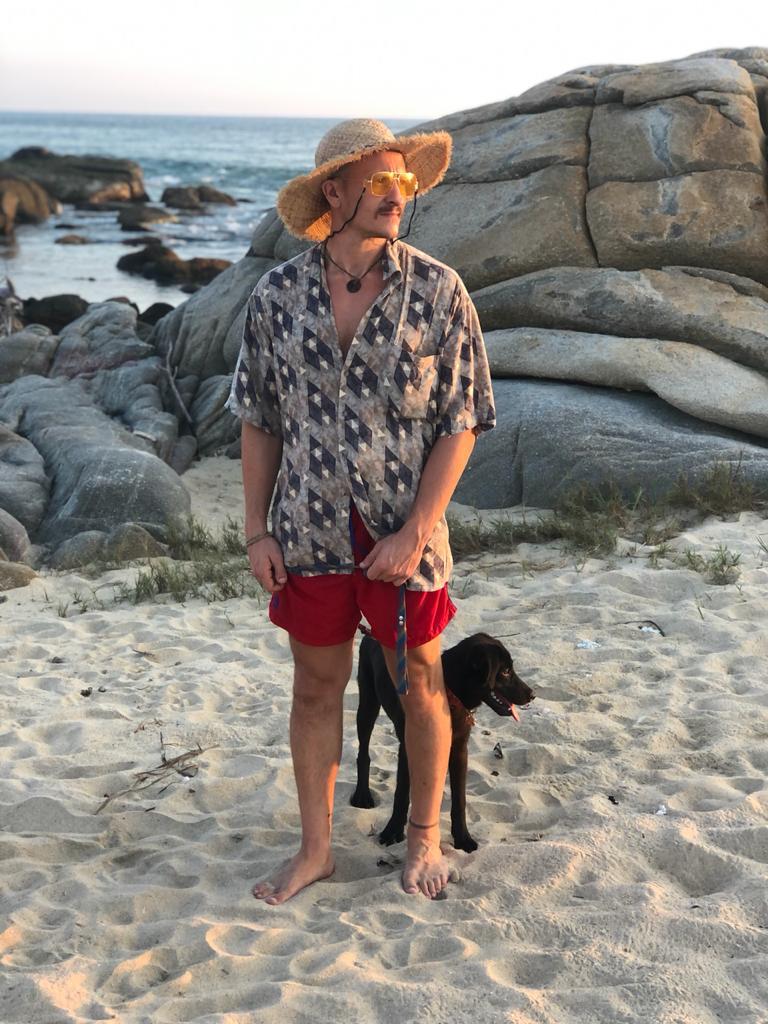
14 – What is next for you?
Pursue these current projects, play more music, write more books, sleep 8 hours a night, raise my dog, work out every day, and live a full life.
Not particularly, but did I mention I wrote a book! 🙂 (Really, all the best thoughts I’ve ever had on these subjects and life, in general, are in there. Check it out!)
Thank you so much Travis for sharing your incredible story and your experience! It is quite inspiring to see how much taking on 4 years of solo world travel and volunteering could impact someone for the best by opening your eyes to a different world, a world where you don’t need to follow the standard rulebook but instead can design life on your own terms! Travis, we are wishing you all the success with your book but also in opening the co-working/co-living community space you have been dreaming about in Mexico! We loved the 100+ days we spent in Mexico in 2018 and we are planning on returning for sure. Maybe we will end up meeting you in Puerto Escondido!
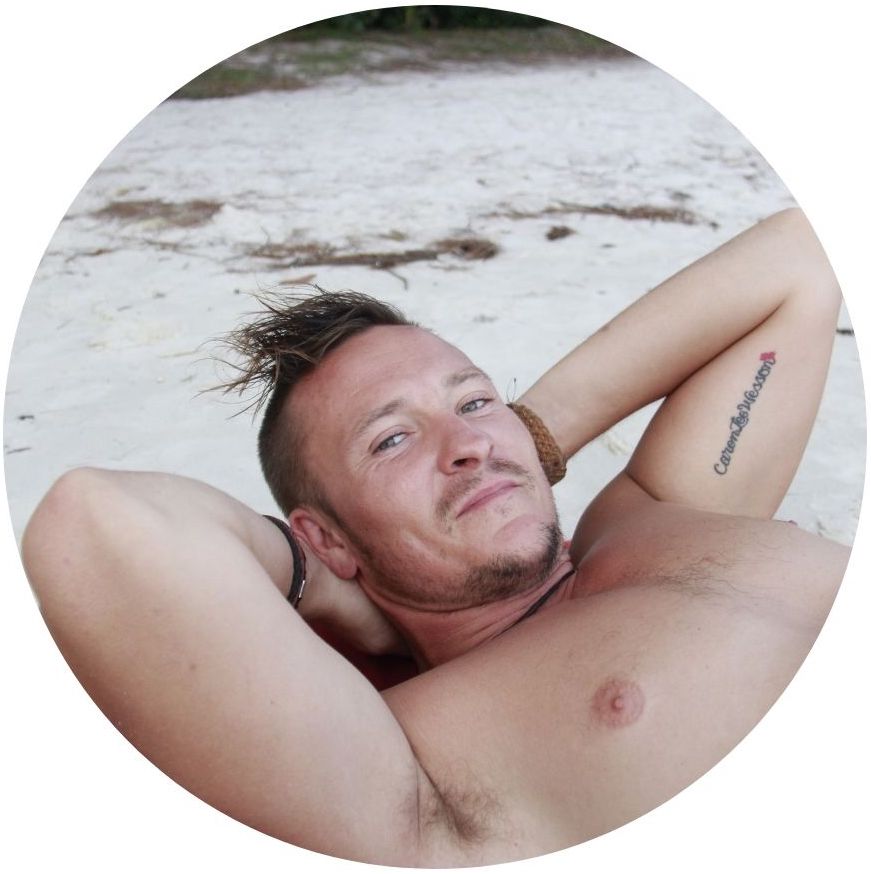
If you want to know more about Travis King, you can find him on the following platforms:
- Website: www.traviswking.com
- Instagram:@traviskingtravels & @ntaa_memoir
Rapid-fire questions
We like ending every interview by asking some fun rapid-fire questions to our guests
| What is your superpower & why? | Community organizing. I don’t know how not to… |
| What is your favorite travel destination & why? | I’ll say Bolivia just because I think it’s SO underrated and it’s got the deep jungle, the salt flats, Lake Titicaca and so many interesting places to explore. |
| What is the best Amazon (or online) purchase you made this past year? | I love my record player. It was technically a gift, but I friggin’ love it. |
| What is the best place Airbnb you’veve ever stayed at and why? | I am not a big fan of Airbnb so I’ll choose a recent one that I really enjoyed, in Chacahua—a magical place on the Oaxacan coast. |
| What’s something you can never live without? | My kindle. I read every morning and every evening and without my kindle, it would be SUCH a struggle to always have something good to read on hand. |
| What’s the best piece of advice you’ve received? | Care Less. It was the final word of advice from the best boss I’ve ever had who left Remote Year about 10 months before it shut down. You can’t control everything, even if you care with every fiber, and simply caring less is a great way to stay above rocky water for someone like me. |
Our Bottom Line
Here are the main lessons we took away from this interview with Travis King:
- Lesson 1 – “ Start doing the changes you want for your life in scalable incremental steps, and know that when it gets hard, that’s when the growth is happening” – This is such great advice. Too often we try to do it all at once and feel that we are trying to conquer a mountain we can’t even see the summit from the bottom. By breaking down the changes we want to made in smaller pieces, things look more doable and we get easier wins along the way to keep the momentum going until we make monumental changes!
- Lesson 2 – “That blueprint for success didn’t […] appeal to me, and it took until that […] trip to South America to accept that I was going to have to disappoint some people to live the best version of my life” – People who decide to challenge the status quo turned out to live their best lives and Travis’ story is such a great example of that! Not only does he manage to significantly lower his cost of living, he is unemployed by design and still gets to accomplish amazing things!
- Lesson 3 – “Care Less” – So true! We should acknowledge that no matter how much effort we spend, we can’t control everything in our life, Instead a better use of our time is to focus our energy to make sure we never have regrets!
- Lesson 4 – “One of the biggest ways I currently save money is by making money when I go out.” – This is another great life saving tip to add to our growing tips shared by previous interviewees! By using his skills, Travis is able to perform at venues he likes and get to enjoy free food/drink on top of the tips he is getting from performing! A great way to save while earning money by doing what you love!
Sometimes we need to hear about others making unconventional decisions before we can have the confidence to make our own. If you have (or are on a path to) an unconventional journey to improve your life that has a nomadic component to it and is interested to share it, please reach out to us as we would love to consider your story for our blog.
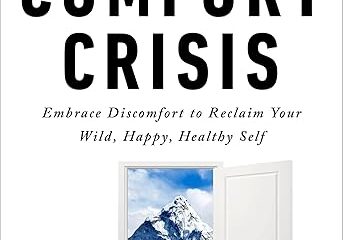
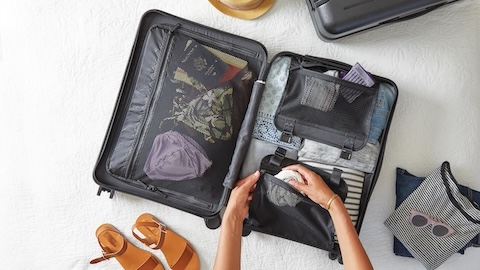
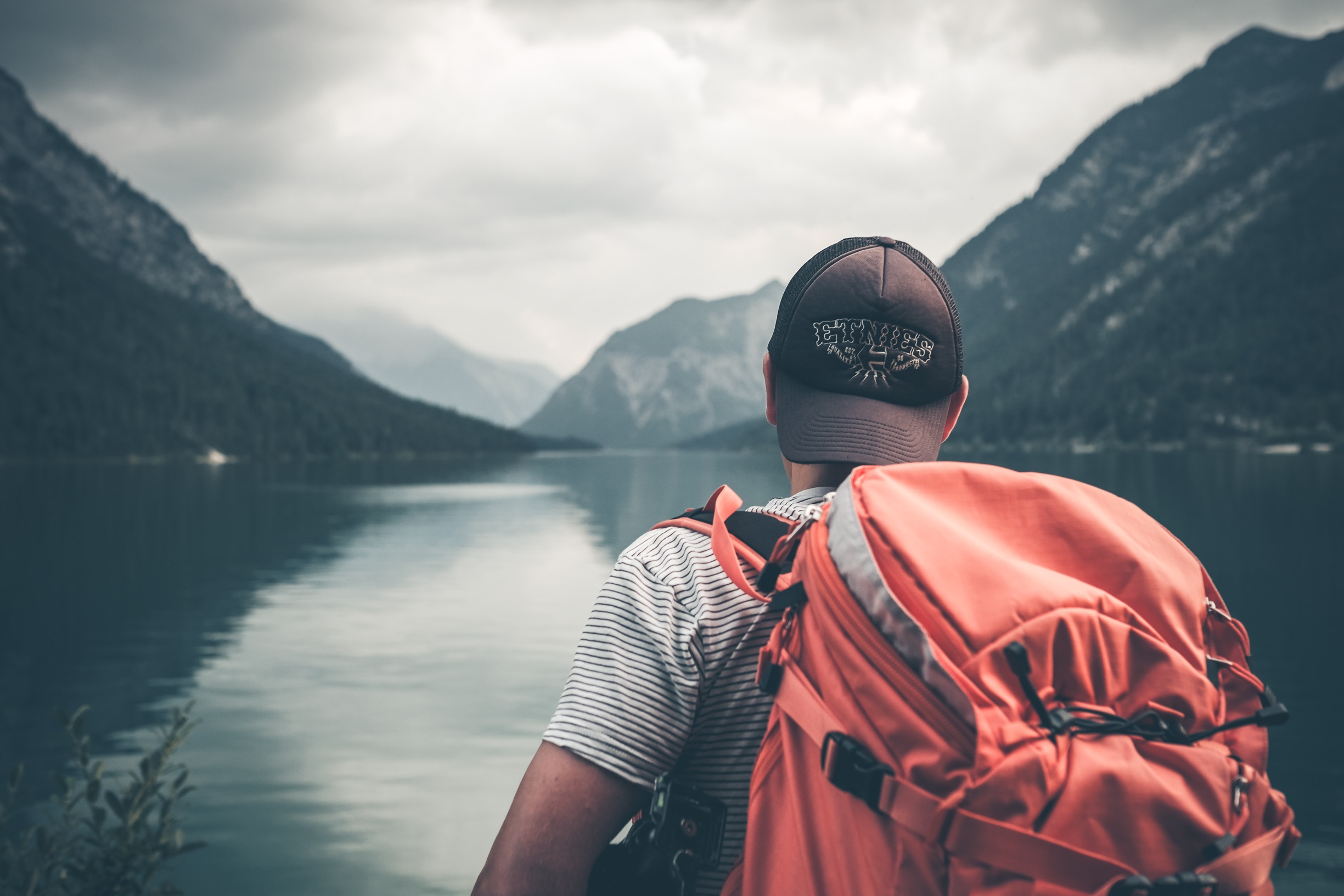
0 Comments